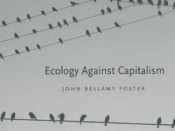“The Rediscovery of Imperialism: Introduction” to Harry Madoff, Essays on Imperialism and Globalization,” Monthly Review vol. 54, no. 6 (November 2002), pp. 1-16. DOI: 10.14452/MR-054-06-2002-10_1
The concept of “imperialism” was considered outside the acceptable range of political discourse within the ruling circles of the capitalist world for most of the twentieth century. Reference to “imperialism” during the Vietnam War, no matter how realistic, was almost always a sign that the writer was on the left side of the political spectrum. In a 1971 foreword to the U.S. edition of Pierre Jalée’s Imperialism in the Seventies Harry Magdoff noted, “As a rule, polite academic scholars prefer not to use the term ‘imperialism.’ They find it distasteful and unscientific.”
Translations:
- Turkish translation in Cosmo Politik, no. 6 (Winter 2002), pp. 16-25.
- Spanish translation at Correntroig, July 6, 2008. Translation by Fernando Lizárraga.

